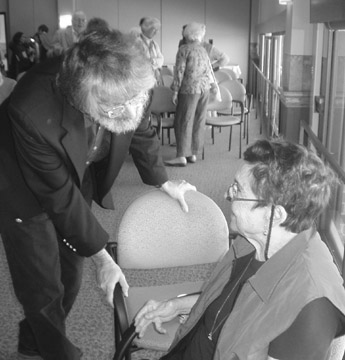Making what UMB English professor Askold Melnyczuk called an “incredibly generous” appearance, world-renowned poetess Adrienne Rich came to UMass Boston last week to read from her new work and receive a standing ovation. Rich, at 74, is frail and rarely travels; she suffers from debilitating arthritis. Professor Melnyczuk had contacted Rich’s agent, who told him that Rich was not up to traveling. A few days later, however, Rich called Professor Melnyczuk herself and told him she would love to come to UMB.
In a show of generosity that displayed her interest in UMass, Rich also waived the better part of her hefty appearance fee, which is a startling display of affection from a poetess whom some call, “the quintessential modern poet.” That left the English Department with only her travel expenses to pay for, and in another rare display of generosity, the provost himself authorized the money for Rich’s first-class airfare. Rich can only fly in first class because of her ailment.
Adrienne Rich spoke to an enthusiastic and responsive audience in the Healey Library at UMass Boston on September 24, 2003. Though Rich is particularly noted as being a powerful voice for feminism, she may also be characterized as one of the most evocative poets of our time for the justice movement in general.
Ms. Rich’s accolades are too many to mention here, but include The National Book Award, The Poet’s Prize, and The Fellowship of American Poets Award. Early on, she was awarded the Yale Younger Poets Prize for her first book. She has previously stated, however, that she perceives herself as “a woman with a mission, not to win prizes, but to change the laws of history.”
Her poetry in the 1950’s was formal and traditional in style. By the 1970’s however, it was contemporary in form and clearly a voice for human rights to especially include feminism. (She now prefers, she has stated, the older term “women’s liberation,” considering it to be more descriptive.)
Her aversion to America’s culture of violence and patriarchy is a hallmark of her work. This was vividly illustrated by her 1971 poem, “Trying to Talk With a Man.” The same themes continue to be threaded though her current works. “Trying to Talk With a Man” reflects specifically anxiety over the testing of nuclear bombs. It begins factually enough: “Out in the desert we are testing bombs/that’s why we came here….” It concludes, more poignantly and personally, “talking of the danger/as if it were not ourselves/as if we were testing anything else.”
Though she is slightly stooped by her years and her dark hair is streaked with gray, Rich’s voice conveys strength born of moral authority. “Why,” she demanded of her UMB audience, “can’t this president (Bush) declare a war on ignorance?” Her phrases are as provocative and illuminating as the lightning’s flash. Quoting her own poetry during her reading, she referred to “the desert where missiles are planted like corn,” and noted that, “a patriot is not a weapon.”
She also praised the online magazine “Words Without Borders” and noted the “particularity of individuals,” including poets of other nationalities and ethnicity’s.
Inevitably, Rich’s outspokenness has generated detractors. The Irish poet Derek Mahon, for example, once referred to her as “cold, wicked, and dishonest” and deplored the “victimology” of Rich’s ideas, a victimology which according to Mayon, “seduced younger women poets.”
“Perhaps,” Rich rebutted, “it [her poetry] might be threatening to him as a male in a country where poetry has been so predominantly male turf.”
Rich has long asserted that, “poetry makes a huge difference.” Further, she has noted that in “almost any other country, any other culture, it’s been taken for granted that poets would take part in the government, they would be sent here and there as ambassadors by the state proudly, that their being poets was part of why they were considered valuable citizens – Yeats in Ireland, Neruda in Chile, St. John Perse in France.” She characterized poetry as being “the liquid voice that can wear through stone.” Similarly, in a 1994 issue of The Progressive, she stated to editor Mathew Rothschild that poetry has “revolutionary power…it’s such a portable art, for one thing; it travels…[it is] an ever-growing current that’s being fed by all these rivulets that were themselves under ground.”
Her presentation and poetry make it more understandable that the current administration, speaking through First Lady Laura Bush, saw fit to cancel poetry day at the White House this year. Poetry after all, can be as intrusive and revealing as the dentist’s drill, particularly when the poet is as perceptive and fearlessly individualistic as Adrienne Rich.





















































